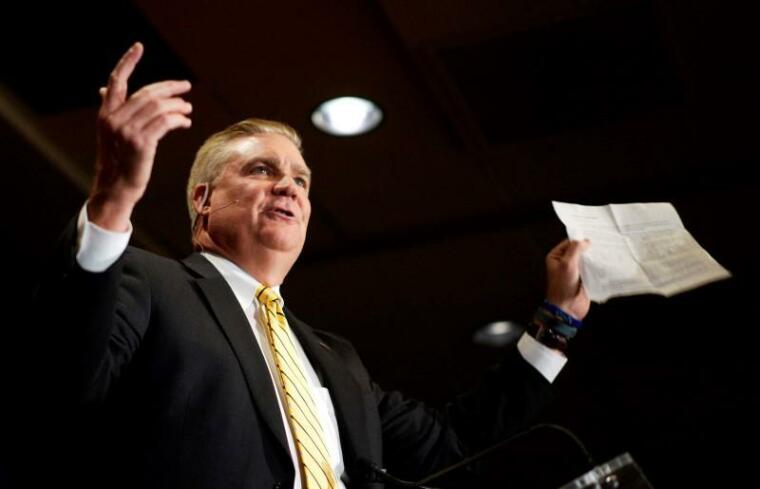GOP faith ambassador resigns, citing party's 'tone deaf attitude' towards voting bloc

The national GOP's first-ever director of evangelical outreach has announced his resignation, citing the political party's "tone deaf attitude" toward a crucial Republican voting bloc.
Chad Connelly, who had served as the Republican National Committee's (RNC) director of the Faith Engagement Initiative since 2013, complained that religious outreach has not been prioritized by the party under the leadership structure implemented by President Donald Trump's administration.
"The treatment I received from the new political department has been disrespectful, antagonistic and unacceptable," Connelly wrote in an email circulated to close friends last week. "GOP Faith in general and me in particular, just don't have the priority I anticipated," he added.
Connelly said that he was surprised by "the treatment I received but mostly at the tone deaf attitude" toward religious voters from RNC officials.
The RNC rejected Connelly's claims and said that his resignation had more to do with concerns about his job performance.
"Chad failed to meet simple metrics, expectations and responsibilities crucial to his duties at the RNC. Because of the importance of faith engagement to the RNC, it was time to move in a new direction in the department in order to expand our efforts," RNC political director Juston Johnson stated, as reported by Associated Press.
Connelly, who previously served as the chairman of the South Carolina Republican Party, was tapped by former White House chief of staff Reince Priebus in 2013 to be the RNC's director of faith engagement.
In his email, he highlighted the importance of the nation's faith community in winning the elections.
"Pastors and faith leaders and people sitting in pews are THE key element in winning elections. An increase in church engagement of only a few percentage points is often the difference in victory and defeat," he wrote.
Trump's victory in the last presidential election has been partially attributed to his popularity among white evangelical voters. He garnered the votes of 81 percent of white evangelical Christians, a figure higher than the GOP's last three presidential nominees.
In 2008, 73 percent of white evangelical Protestants voted for John McCain, a longtime critic of the Christian Right. Mitt Romney, a Mormon, won the votes of 79 percent of white evangelicals in 2012 — the same margin of support that George W. Bush received in 2004.
Johnson had vowed that the RNC's faith and engagement team would have "a larger footprint" in the 2018 midterm elections.
 Christians don't have to affirm transgenderism, but they can’t express that view at work: tribunal
Christians don't have to affirm transgenderism, but they can’t express that view at work: tribunal Archaeology discovery: Medieval Christian prayer beads found on Holy Island
Archaeology discovery: Medieval Christian prayer beads found on Holy Island Presbyterian Church in America votes to leave National Association of Evangelicals
Presbyterian Church in America votes to leave National Association of Evangelicals Over 50 killed in 'vile and satanic' attack at Nigerian church on Pentecost Sunday
Over 50 killed in 'vile and satanic' attack at Nigerian church on Pentecost Sunday Ukrainian Orthodox Church severs ties with Moscow over Patriarch Kirill's support for Putin's war
Ukrainian Orthodox Church severs ties with Moscow over Patriarch Kirill's support for Putin's war Islamic State kills 20 Nigerian Christians as revenge for US airstrike
Islamic State kills 20 Nigerian Christians as revenge for US airstrike Man who served 33 years in prison for murder leads inmates to Christ
Man who served 33 years in prison for murder leads inmates to Christ


 Nigerian student beaten to death, body burned over ‘blasphemous’ WhatsApp message
Nigerian student beaten to death, body burned over ‘blasphemous’ WhatsApp message 'A new low': World reacts after Hong Kong arrests 90-year-old Cardinal Joseph Zen
'A new low': World reacts after Hong Kong arrests 90-year-old Cardinal Joseph Zen Iran sentences Christian man to 10 years in prison for hosting house church worship gathering
Iran sentences Christian man to 10 years in prison for hosting house church worship gathering French Guyana: Pastor shot dead, church set on fire after meeting delegation of Evangelicals
French Guyana: Pastor shot dead, church set on fire after meeting delegation of Evangelicals ‘Talking Jesus’ report finds only 6% of UK adults identify as practicing Christians
‘Talking Jesus’ report finds only 6% of UK adults identify as practicing Christians Mission Eurasia ministry center blown up in Ukraine, hundreds of Bibles destroyed: 'God will provide'
Mission Eurasia ministry center blown up in Ukraine, hundreds of Bibles destroyed: 'God will provide' Church holds service for first time after ISIS desecrated it 8 years ago
Church holds service for first time after ISIS desecrated it 8 years ago Burger King apologizes for 'offensive campaign' using Jesus' words at the Last Supper
Burger King apologizes for 'offensive campaign' using Jesus' words at the Last Supper Uganda: Muslims abduct teacher, burn him inside mosque for praying in Christ’s name
Uganda: Muslims abduct teacher, burn him inside mosque for praying in Christ’s name